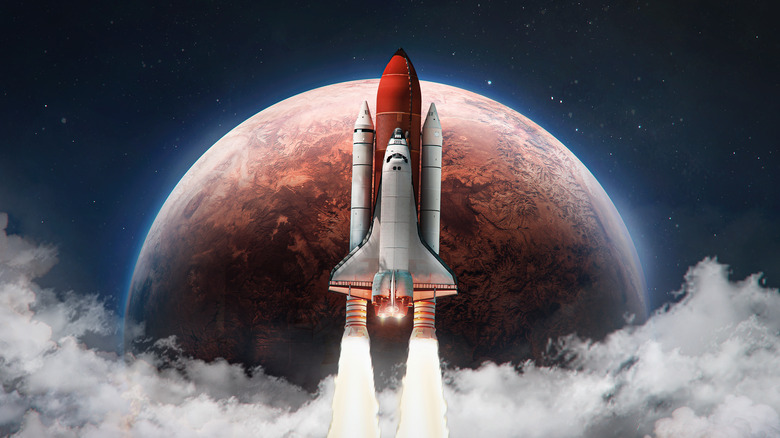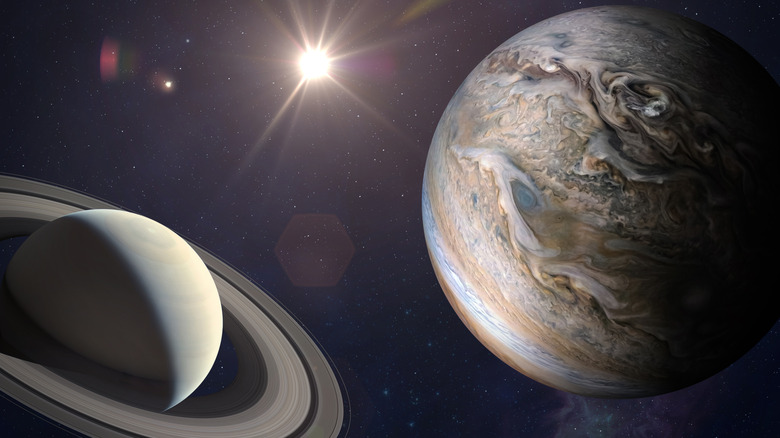Here's What Would Happen If Every Planet Doubled In Size
Hypothetical exploration of the outer reaches of the cosmos is something that has entertained and mystified humans for centuries. For as long as people have looked up in wonder, they've contemplated creation stories, epic cosmic dramas, and much more. Greek Reporter notes that ancient Greeks considered the stars to be placed in their precise configuration by the gods, with much of the mythos of the Greek gods intimately linked with the outer reaches of what humans could see up in the sky.
One fascination that's hung around is in relation to the sizes of each planet. Earth is perfectly suited to sustaining life as we know it. It's positioned at a prime distance from the Sun, exhibits a natural magnetic field and atmosphere that work together to protect the surface from solar radiation and the escape of oxygen, and contains within its system an abundance of carbon, hydrogen, and other elements that provide the building blocks of teeming life, per American Museum of Natural History.
But there's something else at play that is often overlooked when considering the platform for development. The size of the planet provides a favorable gravitational force that all organisms have perfectly adapted to over millennia.
Earth's altered gravitational force would transform the human condition
First and foremost, a doubled planetary size would result in a quadrupled surface area (based on formulas for spherical surface area calculation, via CueMath). This enormous change in mass would immediately change the pull of gravity on the human body and on everything else that exists within the Earth's orbit.
For one thing, the physical weight of our bodies wouldn't change, but our perception of that weight's heft would double. Similarly, because of the added atmospheric pressure, the hearts of every living thing on the planet would suddenly have to work twice as hard to pump blood through internal, organic systems. It's quite possible that, in the same way as an engine or appliance is rated for certain work duration figures, the heart would suddenly be half as effective, shortening the lifespan of all living things by a concurrent 50%.
In addition to the physical and social toll that increased gravitational force would take on humans, creating the force necessary to launch rockets into space would become astronomically more challenging, cutting off the widespread potential to escape this new ever-present prison of weight and bodily overload (via What If).
Another important consideration in this hypothetical is the stability of plant life. Plants provide the oxygen that humans need to survive through the process of photosynthesis. Yet, plants often make use of somewhat flimsy trunk structures that might not hold up to the new atmospheric challenges, further threatening life on the planet.
The greater solar system would look a lot different, too
In addition to severe changes on the Earth's surface, a doubling of each additional planet in our solar system would fundamentally change the way this complex system behaves and looks. First of all, asteroids, moons, and Saturn's iconic rings would all become lost to the enhanced gravitational field of the nearby planets.
NASA reports that the rings of Saturn are formed of comets, asteroids, and other space debris that, over countless millions of years, became trapped in the planet's gravity field and were slowly torn apart. Eventually, these smaller pieces settled into orbit around the planet, in addition to more than 50 confirmed moons.
Closer to home, a change in the mass of Mars could provide the impetus needed to reestablish the magnetic field that scientists have established it once fostered (via Science). This field is crucial to supporting life on the surface, according to Reader's Digest, as it wards off harmful solar radiation — just like our own planet's does.
Even though this is a thought experiment, it brings about interesting questions surrounding future space exploration opportunities. For instance, it's recently been discovered that phosphine is produced on Venus, leading scientists to believe that anaerobic life may be present on the surface (via The New York Times). Furthermore, Venus' atmosphere is so dense that a mission to Venus aimed at returning would have to overcome something similar to the gravitational problem that would befall a doubled Earth.


